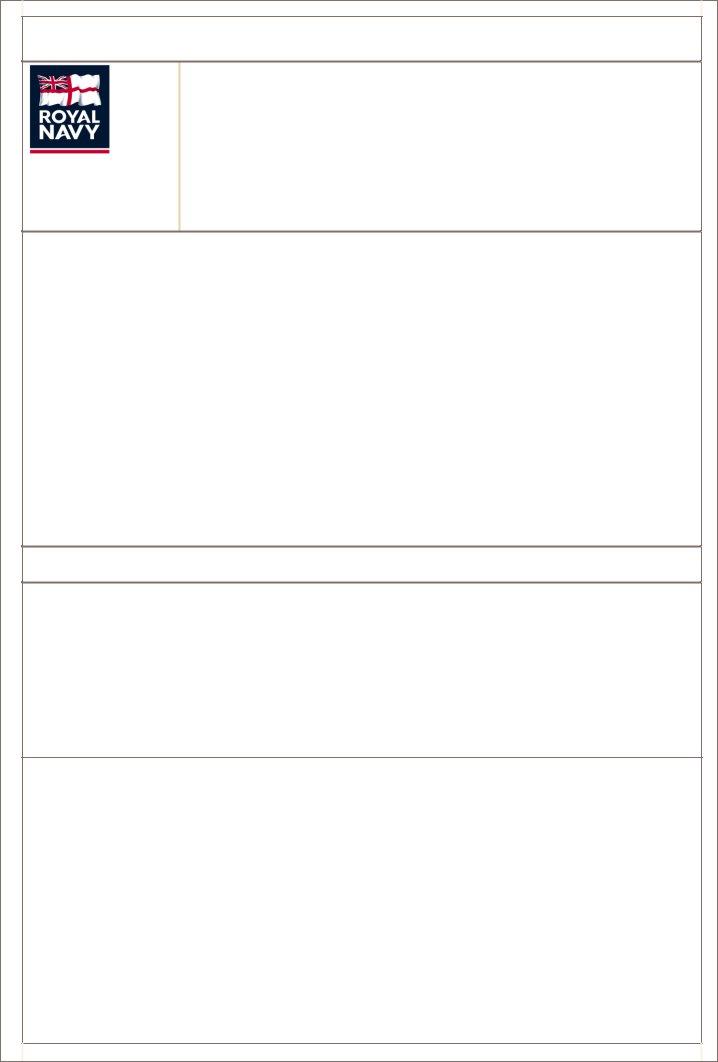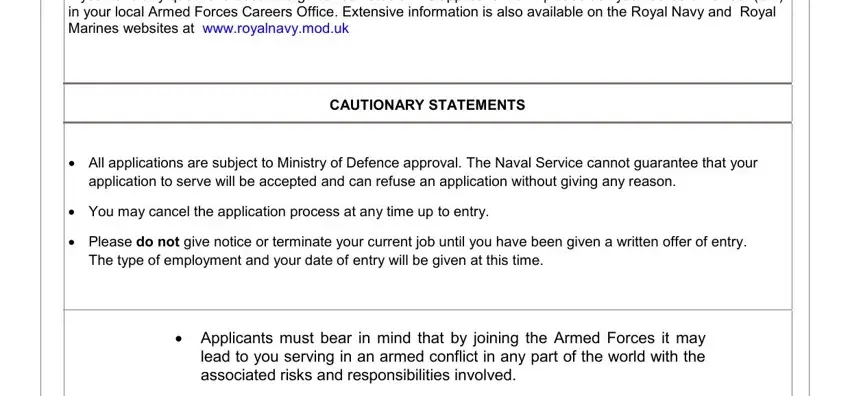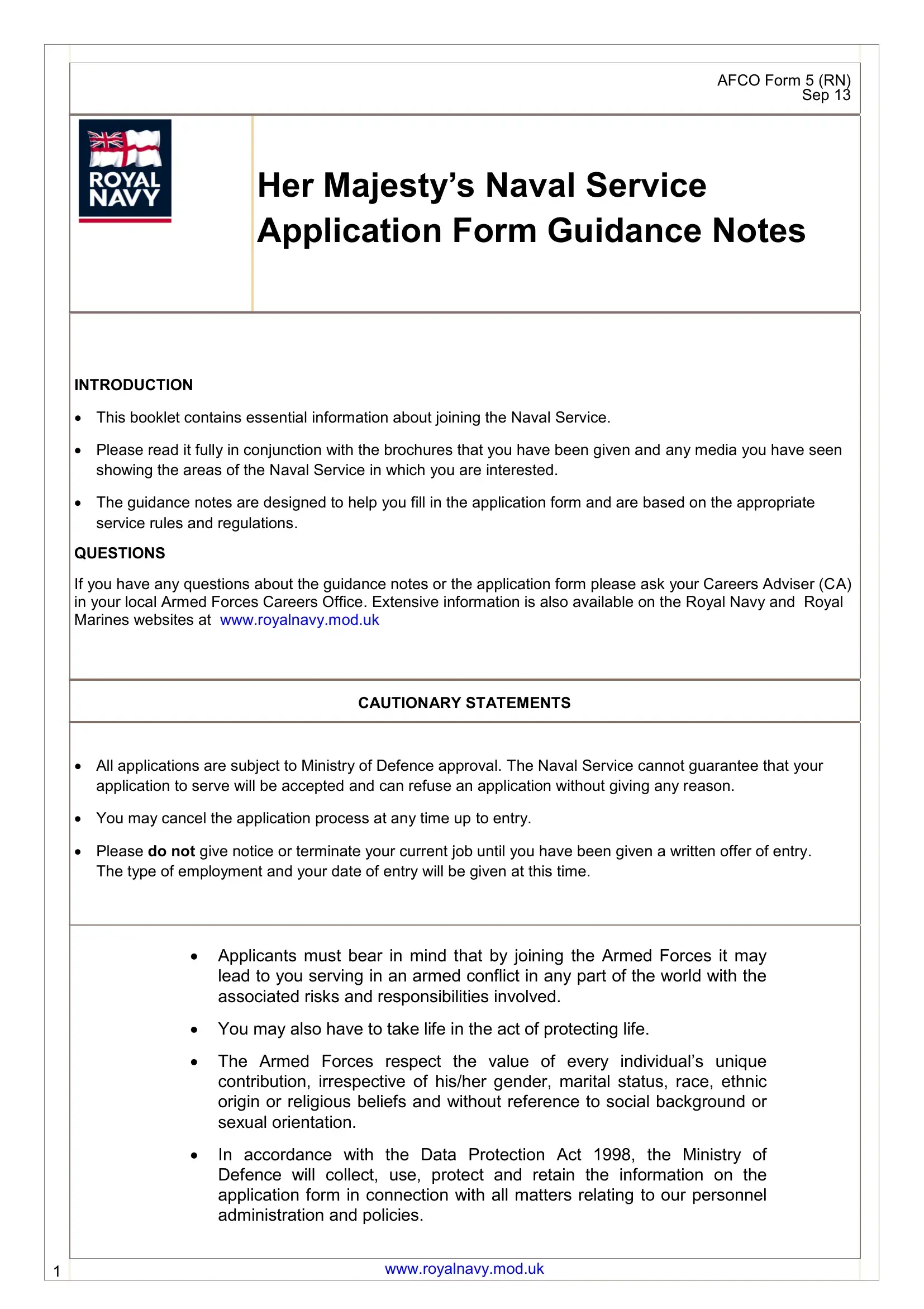
AFCO Form 5 (RN)
Sep 13
Her Majesty’s Naval Service
Application Form Guidance Notes
INTRODUCTION
∙This booklet contains essential information about joining the Naval Service.
∙Please read it fully in conjunction with the brochures that you have been given and any media you have seen showing the areas of the Naval Service in which you are interested.
∙The guidance notes are designed to help you fill in the application form and are based on the appropriate service rules and regulations.
QUESTIONS
If you have any questions about the guidance notes or the application form please ask your Careers Adviser (CA) in your local Armed Forces Careers Office. Extensive information is also available on the Royal Navy and Royal Marines websites at www.royalnavy.mod.uk
CAUTIONARY STATEMENTS
∙All applications are subject to Ministry of Defence approval. The Naval Service cannot guarantee that your application to serve will be accepted and can refuse an application without giving any reason.
∙You may cancel the application process at any time up to entry.
∙Please do not give notice or terminate your current job until you have been given a written offer of entry. The type of employment and your date of entry will be given at this time.
∙Applicants must bear in mind that by joining the Armed Forces it may lead to you serving in an armed conflict in any part of the world with the associated risks and responsibilities involved.
∙You may also have to take life in the act of protecting life.
∙The Armed Forces respect the value of every individual’s unique contribution, irrespective of his/her gender, marital status, race, ethnic origin or religious beliefs and without reference to social background or sexual orientation.
∙In accordance with the Data Protection Act 1998, the Ministry of Defence will collect, use, protect and retain the information on the application form in connection with all matters relating to our personnel administration and policies.
www.royalnavy.mod.uk
CONDITIONS OF STANDARDS AND BEHAVIOUR
Before filling in the application form you should understand the Standards and Behaviour
that will be expected of you during service with the Armed Forces.
Commitment
In joining the Naval Service, you will be entering a disciplined organisation that has different requirements from civilian life. There will be times when the requirements of the Service take priority over personal needs; for example, you will be liable for duty at any time of the day or night, seven days a week. In addition, you may be required to serve in any part of the world.
Discipline
Behaviour that does not amount to a crime as a civilian can be a disciplinary matter in the Naval Service and will carry appropriate penalties. For instance, you can be disciplined for disobeying an order, being untidily dressed, being late for work or taking unauthorised absence from your place of duty.
Integrity
Dishonesty of any kind is unacceptable and can damage morale and trust.
Alcohol
Drunkenness is an offence under the Service Discipline Act and is taken very seriously by the Naval Service. Those who persistently offend may be administratively discharged.
Standards of Behaviour
In the Service environment where men and women may live in close proximity, particularly high standards of behaviour are demanded. Where restrictions are placed on sexual activity, any breach may lead to administrative or disciplinary action.
Bullying
Ill-treatment and bullying are unacceptable. Disciplinary action will be taken against offenders.
Sexual and Racial Discrimination
Any form of sexual or racial harassment or discrimination will not be tolerated and disciplinary
action will be taken against offenders. The Naval Service respects the value of every individual’s unique
contribution, irrespective of gender, marital status, race, ethnic origin or religious belief and without reference to social background or sexual orientation. Your application will be rejected if you are (or have been) a member or supporter of – or associated with – any group or organisation whose purpose includes provocation to racial hatred and violence.
Equality and Diversity
The Armed Forces diversity policy is to treat all personnel fairly, irrespective of gender, marital status, race, ethnic origin or religious belief and without reference to social background or sexual orientation. The policy goes further than mere elimination of unlawful discrimination. It recognises and values individuals from diverse backgrounds, who bring fresh ideas, perceptions, skills and attributes. This enables the Armed Forces to recruit from the widest possible base, helping us to achieve and sustain our manning needs, and to maintain operational capability.
Conclusion
If for any reason, you anticipate that it will be difficult for you to meet the required standards; you should consult your local Armed Forces Careers Office who will be able to advise you on whether a service career is the right choice for you.
APPLICATION FORM AFCO FORM 4 (RN) GUIDANCE NOTES
The Naval Service.
For the purpose of this form, the Royal Navy, Royal Marines, Royal Marines Band Service, Queen Alexandra’s Royal Naval Nursing Service, Royal Naval Reserve and Royal Marines Reserve will be
collectively known as the Naval Service where the advice given applies to all services.
Royal Navy and Royal Marines Careers Adviser
∙For the purpose of simplicity, the term Careers Adviser (CA) is being used throughout this form.
AFCO Form 4 (RN)
∙The items in brown italics e.g. page 1 refer to the Application Form AFCO Form 4 (RN).
When entering dates in the application form, please use the format requested. If you can’t remember the exact day (for example for periods spent living abroad), use ‘01’ as the default – e.g. 01/07/2008.
www.royalnavy.mod.uk

Musculoskeletal |
|
Any abnormality that interferes with the ability to undertake military training. Spinal |
|
disorders |
|
abnormalities. Certain spinal operations. Recurrent back pain or sciatica. Joint |
|
|
|
disease, pain or limitation of joint movement. Hypermobility (laxity) of the joints. Bone |
|
|
|
|
|
|
or joint operations within the last 12 months. Anterior cruciate ligament reconstruction. |
|
|
|
Recurrent joint dislocations. Severe deformity following fractures. Loss of a limb. Foot |
|
|
|
abnormalities (e.g. club foot or hammer toe). Complete loss of either big toe. Complete |
|
|
|
loss of either thumb. Arthritis and similar conditions. Fractures within the last 12 |
|
|
|
months, except fractures of the digits / clavicles. |
|
Blood disorders |
|
Certain blood diseases, such as G6PDD, sickle cell disease, congenital spherocytosis, |
|
|
|
haemoglobinopathy. Any bleeding disorder or abnormality of blood clotting. |
|
|
|
|
Infections |
|
Human immunodeficiency virus (HIV) or Acquired Immune Deficiency Syndrome |
|
|
|
AIDS). Carriers of hepatitis viruses. |
|
|
|
|
Malignancy |
|
Most cancers are considered to place an applicant below the medical entry standard. |
|
|
|
Exceptions: some cancers in childhood or early adult life that have been successfully |
|
(cancer) |
|
|
|
|
treated and are regarded as cured. |
|
|
|
|
Allergic disorders |
|
Severe allergic reactions and/or anaphylaxis. A need to carry adrenaline injections |
|
|
|
(EPIPEN, etc). Nut and peanut allergy. Egg allergy. Latex allergy. Vaccine allergy |
|
|
|
|
|
|
(including tetanus allergy). Gluten sensitivity (Coeliac disease). |
|
Conditions resulting |
|
|
|
from exposure to |
|
Heat illness. Frostbite and non-freezing cold injury. |
|
extremes of |
|
|
|
temperature |
|
|
|
|
|
|
|
Psychiatric |
|
Ongoing psychiatric illness. Psychosis. Schizophrenia. Obsessive-compulsive |
|
disorders |
|
disorder. Autism. Personality disorder. More than one episode of deliberate self-harm |
|
|
|
of any type. Post-traumatic stress disorder (PTSD). Alcohol, drug or substance |
|
|
|
|
|
|
dependence. Attention deficit hyperactivity disorder (ADHD) unless free of symptoms |
|
|
|
and not requiring treatment for at least three years. Anorexia and bulimia. |
|
Kidney disorders |
|
Ongoing kidney disease. Polycystic kidney disease and kidney stones. Donation of |
|
|
|
kidney in the past six months. |
|
|
|
|
Other |
|
Transplanted organs. |
|
|
|
|
|
Temporary conditions |
|
|
The following conditions require the selection procedure and/or entry to be temporarily put on hold until you are fully recovered, discharged from hospital follow-up, and fit to undergo arduous training:
∙Pregnancy
∙Waiting list for an operation
∙Temporary illness or injury
At the discretion of Service medical authorities, your application may be rejected, due to other medical reasons. If none of the conditions above apply, tick the yes box of the application form at paragraph 3.4. page 3
8. Height and Weight
∙General Service: Height 151.5cm. Weight - Healthy Body Mass Index (BMI) Range
∙Submarine Service: Height 157cm. Weight - Healthy Body Mass Index (BMI) Range
∙Royal Marines: Height 151.5cm. Minimum weight 65Kg including reserve forces.
9. Eye Sight
The minimum standards for both uncorrected and corrected vision are determined by service medical staff and are dependent on the proposed employment and branch/trade group. Spectacle or contact lens correction must not be greater than -6 dioptres or +6 dioptres in any meridian. Impaired colour perception (colour blindness) is not a bar to service, but may limit your career choices. You will need to have a copy with you of any acuity prescription from your optician when you go for your medical examination.
Rehabilitation of Offenders Act 1974 page 3
10.If you have civilian or military offences against your name, whether Spent or Unspent, then please read the accompanying form MOD Form 493 Rehabilitation of Offenders Act 1974 before you answer any questions on the subject. This explains whether you have to give the details of any convictions. You may be prevented from entering or re-entering the Armed Forces if you have committed certain offences or have undergone certain types of sentence. Additionally having an 'unspent' conviction does not necessarily mean that you will be unable to join the Armed Forces. Your CA will be able to help to clarify your particular situation.
For all branches of the Service you will have to undergo a Security Check (SC). You will have to declare any Spent convictions for these checks. see also Note 23
www.royalnavy.mod.uk
You are required to complete the certificate on page 4 of the MOD Form 493 Rehabilitation of Offenders Act 1974, and, if applicable, you should provide the following information:
∙Offence or allegation (including date and place)
∙Name of court and date of hearing
∙Final or interim result or sentence/fine
At all times during the application process you are requested to keep the CA informed of any changes to your circumstances as regards offences, including if you are awaiting a court appearance for a criminal offence, or in any capacity (including jury service) other than as a witness, until the outcome of the hearing is known. This may cause a delay to the application process.
11. Criminal Justice and Court Services Act 2000 – Criminal Records Bureau (CRB) Check
There is a statutory requirement for applicants who seek to join certain branches or specialisations (those that work with children or vulnerable adults) to undergo suitability checks by the Criminal Records Bureau. These checks include the disclosure of your criminal record. If appropriate, a Suitability Certificate will be issued. Your CA will advise you when and how this certificate is to be obtained.
Social History page 3
12. Tattoos
Tattoos that are offensive, obscene or excessive in size or number will be a bar to entry or re-entry. Tattoos that are visible on the head, neck and hand when in parade uniform are a bar to entry. If you have any you will be asked to complete a form describing your tattoos. They will be seen during your medical examination.
13. Body piercing
For health and safety reasons, you will be asked to remove certain items of body piercing jewellery before undergoing physical activity as part of the application and selection process. You will not be allowed to attempt the physical activities if you do not remove the body piercing jewellery when requested. Once you have joined the Armed Forces, you will be advised by Service authorities of the rules for wearing body jewellery when on and off duty. Flesh tunnels are a bar to entry.
14. Drug and Substance Misuse
The short, medium and long-term effects of the misuse of either illegal drugs or substances or legally obtained drugs or substances can have a damaging impact on mental and physical fitness and health. Drug or Substance misuse constitutes a direct threat to the operational effectiveness of the Armed Forces; the security and safety of Service personnel; and, potentially, the security and safety of the civilians whom they protect. Illegal misuse of drugs or substances by Service personnel also damages the reputation and standing of the Service. For all of these reasons, the misuse of drugs or substances is not tolerated within the Naval Service. The Naval Service recognise, however, that drug or substance misuse is increasingly common in civilian life, particularly among the young, and that you may have misused drugs or substances yourself in the past. This will not necessarily prevent you from joining, as all applications are considered individually. Acceptance into the Services will depend on the frequency of use and the class and type of drug or substance that has been misused. Criminal convictions for trafficking or supply of any class of drug or substance will bar entry.
Once you have joined the Naval Service, you are required to stay clear of drugs or substances at all times and also to avoid association with drug or substance misuse and suppliers. Once you have been enlisted, you will be liable by law to random compulsory drug testing throughout your Service career. If these tests show that you have misused drugs or substances, it is Armed Forces policy that, with very few exceptions, you will be discharged.
15. Financial commitments – Debt and Bankruptcy
You may be ineligible to join the Armed Forces if you have financial commitments, debts or loans that you would have difficulty in repaying or lead to financial hardship if you entered the services. Look carefully at the appropriate rates of pay so that you are able to work out your particular situation. The CA will ask you about this and will help you work through any queries.
A person who is declared bankrupt (and as a result does not have a working bank account) or is insolvent may be ineligible to join the Armed Forces. Your CA will be able to assess your situation.
16. Care Order
If you are currently under a Care Order then we will have to seek permission of the local authority for you to join the Naval Service.
17. Dependants
The Naval Service (including the Reserve Forces) often require you to serve away from home for extended periods. The Service you are applying for needs to be sure that your domestic arrangements will not prevent you from doing this. If you are married, or have children or family members who are dependent on you for money or help or both, then certain conditions of service apply. The CA will provide you with the appropriate information.
18. Religion or Belief
The Naval Service encourage enlistment by people of many differing religions and beliefs. However, it must be clear that you may be required to use aggression and/or to take life during your career as part of the Armed Forces. There are also certain rules and regulations that state what type of clothing or dress is compatible or not with operations and for your health and safety. Other considerations may be the handling of certain types of food (as a chef) or the receiving of certain types of medical treatment.
HM GOVERNMENT’S STATEMENT ON VETTING POLICY
22. National Security
In the interests of national security, safeguarding parliamentary democracy and maintaining the proper security
of the Government’s essential activities, it is the policy of HM Government that no one should be employed in
the Armed Forces who is, or has been, involved in or associated with any of the following activities:
∙Espionage;
∙Terrorism;
∙Sabotage; or
∙Actions intended to overthrow or undermine parliamentary democracy by political, industrial or violent means;
or is, or has recently been:
∙A member of any organisation that has advocated such activities;
∙Associated with any such organisation (or any of its members) in such a way as to raise reasonable doubts about his or her reliability;
∙Susceptible to pressure or improper influence, for example because of current or past conduct;
∙Guilty of dishonesty or lack of integrity that throws doubt on their reliability; or
∙Demonstrate behaviour or is subject to circumstances that may otherwise indicate unreliability.
23. Security Check (SC)/Counter-Terrorist Check (CTC)
It is government policy that, for the Naval Service a Security Check and/or a Counter-Terrorist Check is carried out on applicants to confirm their identity, suitability and trustworthiness and this will be done as part of the selection process.
DATA PROTECTION ACT - YOUR RIGHTS AND HOW WE PROTECT THEM
When it comes to the information we hold about you, your rights are set out clearly in the law. The Data Protection Act 1998 also provides that people who record and use personal data must be open about how it is used, and that they must obey the eight Data Protection Principles, which are listed below. In some instances, the law exempts us from these principles. This is normally where obeying the principles would damage the fight against crime, or be against the national interest in some way.
∙Process it fairly and lawfully.
∙Process it for specific purposes and not in any manner incompatible with those purposes.
∙Only process information that is adequate, relevant and not excessive.
∙Ensure that the information is accurate and up to date.
∙Ensure that the information is not kept longer than is necessary.
∙Ensure that the information is treated in accordance with your rights.
∙Take care of your personal information.
∙Ensure that your personal information is not transferred outside the European Economic Area unless there are suitable safeguards in the countries to which it needs to be sent.
If you want to know more about the Data Protection Act 1998, you can either write to the following address:
The Information Commissioner
Wycliffe House, Water Lane, Wilmslow, Cheshire SK9 5AF
Or you can visit their website at www.ico.gov.uk














